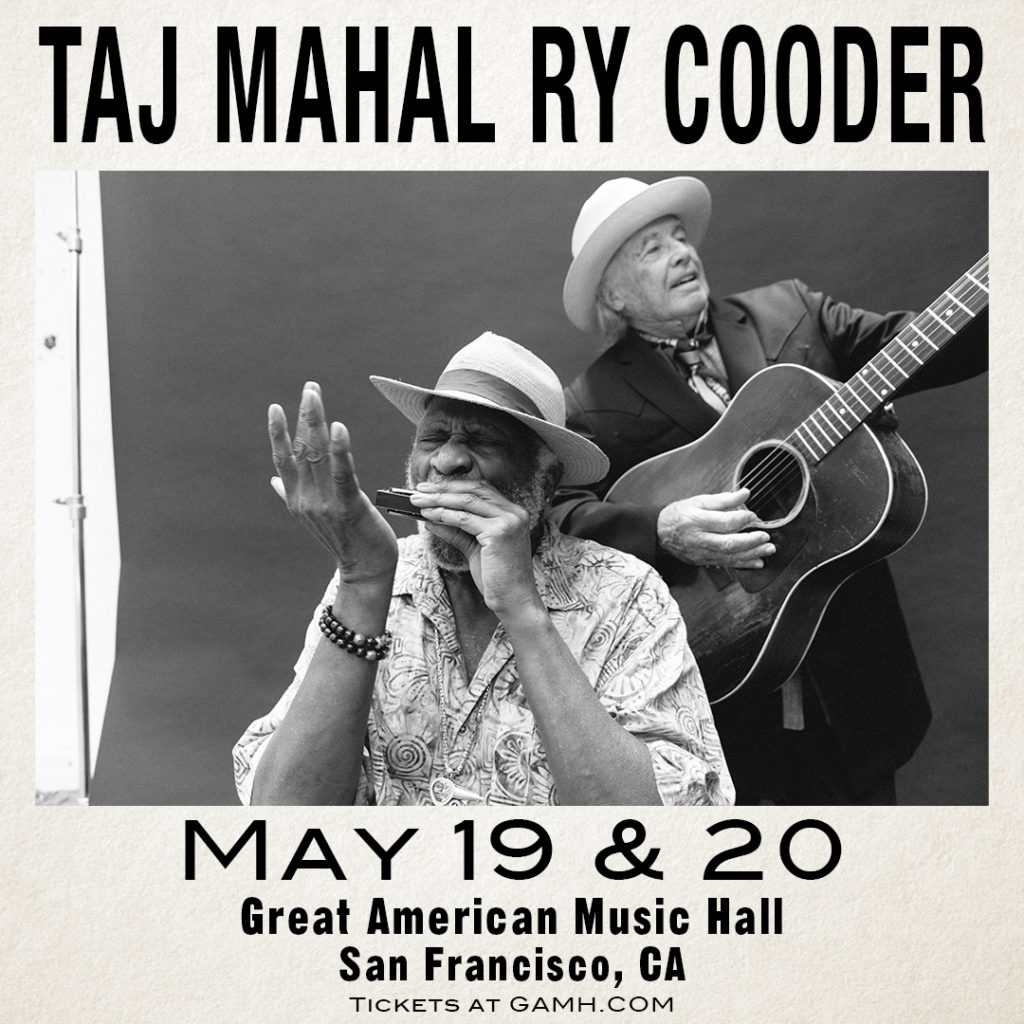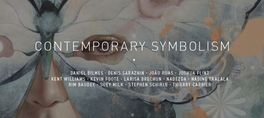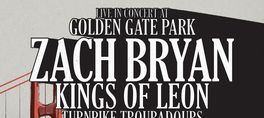Taj Mahal - vocals, harmonica and guitar
Ry Cooder - vocals, guitar, mandolin, and banjo
Joachim Cooder - percussion, mbira
Taj Mahal and Ry Cooder's Get on Board
Needle to the groove, before you know it, you're somewhere: "That whole chugga-chugga-chugga rhythm," says Taj Mahal, "it carried you." There was a seductive kind of locomotion, harmonizing and scene-setting that blues musicians Sonny Terry and Brownie McGhee set forth,"could get together." It worked a spell. Gave you a hint of what was rounding the corner, heading your way.
While a young musician, still tinkering with his sound, Taj Mahal had heard the names "Sonny and Brownie," in passing conversation, but it wasn't until he got to the University of Massachusetts in 1961 that a new world cracked open. "It's when I encountered a whole different level of record recording and collecting that didn't have anything to do with popular music on the radio. You know labels like Folkways, Prestige, Bluesville, Stinson, Vanguard, all these different companies that were putting out all these records--Pete Seeger, Reverend Gary Davis, Doc Watson. There was this whole movement." But, in time Taj Mahal saw first-hand, "Brownie McGhee and Sonny Terry were in the middle of this whole thing."
Later, when he pulled Sonny Terry's 1963 album Sonny is King out of its sleeve and gave it a spin, his curiosity only deepened. "I mean this fascinating sound, straight out of the country"--his harmonica's earthy whoops and hollers, his sustained curving simulation of a train's echoing whistle. "About that same time both Sonny and Brownie were coming around doing concerts at colleges, small clubs and coffeehouses so I was able to get into that whole thing." What struck Taj Mahal was the richness, the specificity--of time and place and sentiments that the music, live and on record, preserved. "I was like, look over here. This is a whole world unto itself. The music isn't disappearing. There are folks who think that it is important enough for it to be here." Born in Harlem and living in Massachusetts, reflects Taj Mahal, "I might have been 'up north,' but I was 'up south.'"
On the other edge of the country, as had become his custom, a twelve-year-old Ry Cooder had boarded two buses, to make his way to a favorite record store, housed in an old California Bungalow at the center of Los Angeles. "It was run by the Fox sisters and they had all of these records. They had a Webcor record player where you could listen. And I saw this ten-inch record with these black and white pictures, and how they laid out the photos." He was drawn to the story the cover suggested: the musicians' faces, the liner notes, the title itself, Get on Board, was an invitation. "There was something about the information. It was not processed. It was just something you should know about. And it cost $4.98. I bought it, took it home and it really rocked," Cooder recalls, "just really swinging and strong. When you're young and you hear something like that for the first time and if you're a kid in Santa Monica, well, it was just unbelievable."
For both musicians, Sonny and Brownie were a glimpse onto something vanishing fast--a pathway, both back to the past and, for them creatively, a step forward into their futures.
show less
Ry Cooder - vocals, guitar, mandolin, and banjo
Joachim Cooder - percussion, mbira
Taj Mahal and Ry Cooder's Get on Board
Needle to the groove, before you know it, you're somewhere: "That whole chugga-chugga-chugga rhythm," says Taj Mahal, "it carried you." There was a seductive kind of locomotion, harmonizing and scene-setting that blues musicians Sonny Terry and Brownie McGhee set forth,"could get together." It worked a spell. Gave you a hint of what was rounding the corner, heading your way.
While a young musician, still tinkering with his sound, Taj Mahal had heard the names "Sonny and Brownie," in passing conversation, but it wasn't until he got to the University of Massachusetts in 1961 that a new world cracked open. "It's when I encountered a whole different level of record recording and collecting that didn't have anything to do with popular music on the radio. You know labels like Folkways, Prestige, Bluesville, Stinson, Vanguard, all these different companies that were putting out all these records--Pete Seeger, Reverend Gary Davis, Doc Watson. There was this whole movement." But, in time Taj Mahal saw first-hand, "Brownie McGhee and Sonny Terry were in the middle of this whole thing."
Later, when he pulled Sonny Terry's 1963 album Sonny is King out of its sleeve and gave it a spin, his curiosity only deepened. "I mean this fascinating sound, straight out of the country"--his harmonica's earthy whoops and hollers, his sustained curving simulation of a train's echoing whistle. "About that same time both Sonny and Brownie were coming around doing concerts at colleges, small clubs and coffeehouses so I was able to get into that whole thing." What struck Taj Mahal was the richness, the specificity--of time and place and sentiments that the music, live and on record, preserved. "I was like, look over here. This is a whole world unto itself. The music isn't disappearing. There are folks who think that it is important enough for it to be here." Born in Harlem and living in Massachusetts, reflects Taj Mahal, "I might have been 'up north,' but I was 'up south.'"
On the other edge of the country, as had become his custom, a twelve-year-old Ry Cooder had boarded two buses, to make his way to a favorite record store, housed in an old California Bungalow at the center of Los Angeles. "It was run by the Fox sisters and they had all of these records. They had a Webcor record player where you could listen. And I saw this ten-inch record with these black and white pictures, and how they laid out the photos." He was drawn to the story the cover suggested: the musicians' faces, the liner notes, the title itself, Get on Board, was an invitation. "There was something about the information. It was not processed. It was just something you should know about. And it cost $4.98. I bought it, took it home and it really rocked," Cooder recalls, "just really swinging and strong. When you're young and you hear something like that for the first time and if you're a kid in Santa Monica, well, it was just unbelievable."
For both musicians, Sonny and Brownie were a glimpse onto something vanishing fast--a pathway, both back to the past and, for them creatively, a step forward into their futures.
Taj Mahal - vocals, harmonica and guitar
Ry Cooder - vocals, guitar, mandolin, and banjo
Joachim Cooder - percussion, mbira
Taj Mahal and Ry Cooder's Get on Board
Needle to the groove, before you know it, you're somewhere: "That whole chugga-chugga-chugga rhythm," says Taj Mahal, "it carried you." There was a seductive kind of locomotion, harmonizing and scene-setting that blues musicians Sonny Terry and Brownie McGhee set forth,"could get together." It worked a spell. Gave you a hint of what was rounding the corner, heading your way.
While a young musician, still tinkering with his sound, Taj Mahal had heard the names "Sonny and Brownie," in passing conversation, but it wasn't until he got to the University of Massachusetts in 1961 that a new world cracked open. "It's when I encountered a whole different level of record recording and collecting that didn't have anything to do with popular music on the radio. You know labels like Folkways, Prestige, Bluesville, Stinson, Vanguard, all these different companies that were putting out all these records--Pete Seeger, Reverend Gary Davis, Doc Watson. There was this whole movement." But, in time Taj Mahal saw first-hand, "Brownie McGhee and Sonny Terry were in the middle of this whole thing."
Later, when he pulled Sonny Terry's 1963 album Sonny is King out of its sleeve and gave it a spin, his curiosity only deepened. "I mean this fascinating sound, straight out of the country"--his harmonica's earthy whoops and hollers, his sustained curving simulation of a train's echoing whistle. "About that same time both Sonny and Brownie were coming around doing concerts at colleges, small clubs and coffeehouses so I was able to get into that whole thing." What struck Taj Mahal was the richness, the specificity--of time and place and sentiments that the music, live and on record, preserved. "I was like, look over here. This is a whole world unto itself. The music isn't disappearing. There are folks who think that it is important enough for it to be here." Born in Harlem and living in Massachusetts, reflects Taj Mahal, "I might have been 'up north,' but I was 'up south.'"
On the other edge of the country, as had become his custom, a twelve-year-old Ry Cooder had boarded two buses, to make his way to a favorite record store, housed in an old California Bungalow at the center of Los Angeles. "It was run by the Fox sisters and they had all of these records. They had a Webcor record player where you could listen. And I saw this ten-inch record with these black and white pictures, and how they laid out the photos." He was drawn to the story the cover suggested: the musicians' faces, the liner notes, the title itself, Get on Board, was an invitation. "There was something about the information. It was not processed. It was just something you should know about. And it cost $4.98. I bought it, took it home and it really rocked," Cooder recalls, "just really swinging and strong. When you're young and you hear something like that for the first time and if you're a kid in Santa Monica, well, it was just unbelievable."
For both musicians, Sonny and Brownie were a glimpse onto something vanishing fast--a pathway, both back to the past and, for them creatively, a step forward into their futures.
read more
Ry Cooder - vocals, guitar, mandolin, and banjo
Joachim Cooder - percussion, mbira
Taj Mahal and Ry Cooder's Get on Board
Needle to the groove, before you know it, you're somewhere: "That whole chugga-chugga-chugga rhythm," says Taj Mahal, "it carried you." There was a seductive kind of locomotion, harmonizing and scene-setting that blues musicians Sonny Terry and Brownie McGhee set forth,"could get together." It worked a spell. Gave you a hint of what was rounding the corner, heading your way.
While a young musician, still tinkering with his sound, Taj Mahal had heard the names "Sonny and Brownie," in passing conversation, but it wasn't until he got to the University of Massachusetts in 1961 that a new world cracked open. "It's when I encountered a whole different level of record recording and collecting that didn't have anything to do with popular music on the radio. You know labels like Folkways, Prestige, Bluesville, Stinson, Vanguard, all these different companies that were putting out all these records--Pete Seeger, Reverend Gary Davis, Doc Watson. There was this whole movement." But, in time Taj Mahal saw first-hand, "Brownie McGhee and Sonny Terry were in the middle of this whole thing."
Later, when he pulled Sonny Terry's 1963 album Sonny is King out of its sleeve and gave it a spin, his curiosity only deepened. "I mean this fascinating sound, straight out of the country"--his harmonica's earthy whoops and hollers, his sustained curving simulation of a train's echoing whistle. "About that same time both Sonny and Brownie were coming around doing concerts at colleges, small clubs and coffeehouses so I was able to get into that whole thing." What struck Taj Mahal was the richness, the specificity--of time and place and sentiments that the music, live and on record, preserved. "I was like, look over here. This is a whole world unto itself. The music isn't disappearing. There are folks who think that it is important enough for it to be here." Born in Harlem and living in Massachusetts, reflects Taj Mahal, "I might have been 'up north,' but I was 'up south.'"
On the other edge of the country, as had become his custom, a twelve-year-old Ry Cooder had boarded two buses, to make his way to a favorite record store, housed in an old California Bungalow at the center of Los Angeles. "It was run by the Fox sisters and they had all of these records. They had a Webcor record player where you could listen. And I saw this ten-inch record with these black and white pictures, and how they laid out the photos." He was drawn to the story the cover suggested: the musicians' faces, the liner notes, the title itself, Get on Board, was an invitation. "There was something about the information. It was not processed. It was just something you should know about. And it cost $4.98. I bought it, took it home and it really rocked," Cooder recalls, "just really swinging and strong. When you're young and you hear something like that for the first time and if you're a kid in Santa Monica, well, it was just unbelievable."
For both musicians, Sonny and Brownie were a glimpse onto something vanishing fast--a pathway, both back to the past and, for them creatively, a step forward into their futures.
show less
Date/Times:
Great American Music Hall (GAMH)
60 Upcoming Events
859 O'Farrell Street, San Francisco, CA 94109
The Best Events
Every Week in Your Inbox
From Our Sponsors
UPCOMING EVENTS
Great suggestion! We'll be in touch.
Event reviewed successfully.









